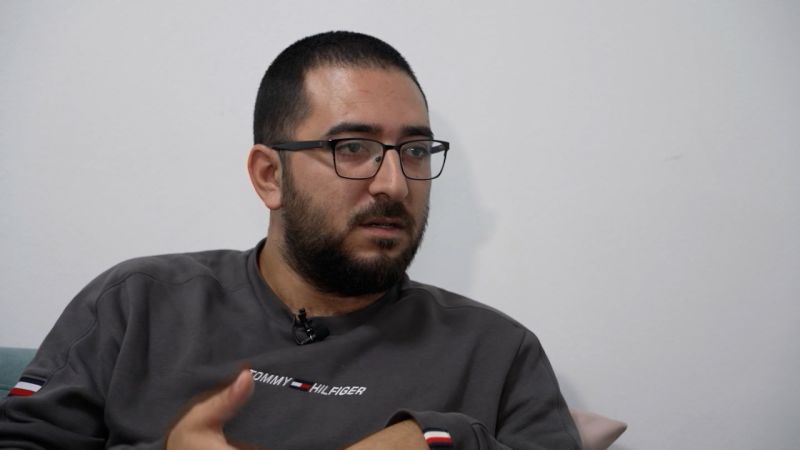A tiny Jerusalem gas station was an unlikely setting for a cautionary tale about Israel’s political evolution.
The station is just a short stroll from the seat of the Israeli government, where full-throated passions played out on the streets on March 27 as pro- and anti-government protesters waved flags and shouted each other down over Prime Minister Benjamin Netanyahu’s proposed judicial reforms.
It seemed to be democracy in action: discontent freely aired, an unruly discourse of sorts – but the events captured on a grainy cell phone shot above the gas station forecourt revealed a darker side of the forces being unleashed.
It was the first time that pro-government groups had come onto the street in such numbers, many of them mustered by Netanyahu’s hard-right coalition partners National Security Minister Itamar Ben Gvir and Finance Minister Bezalel Smotrich. The latter is an icon of the country’s settler movement who has recently dehumanized Palestinians as “an invention of the past century.”
Yellow and black flags of fabled La Familia football thugs – supporters of Netanyahu’s hard-right ministers – fluttered among Israeli flags lofted by fellow demonstrators just yards from the gas station.
Then, a sudden eruption of rage. The cell phone video shows dozens of young Israeli men swarming by the half dozen gas pumps, shouting in anger, rampaging past the queuing cars. Just ahead of them, out of sight of the camera, Palestinian taxi driver Hamza Dweik is fleeing for his life.
A few minutes before the uproar at the gas pump, the 30-year-old father of two had been caught in traffic near the pro-government protesters when a young Israeli man knocked on his car window and asked the question, he said.
“It’s not a normal question you just ask people.”
Suddenly, he was surrounded by people “shouting ‘Arab, Arab, Arab’ and trying to kill [me],” he says.
Dweik called the police and received no answer. Panicked, he tried to maneuver his taxi away from the angry crowd growing around him.
His immediate fear was that they’d claim he was attacking them as he tried to escape in his car. “It’s very easy to someone to move his gun and shoot, it’s very easy,” he said.
“The first thing that I think about when I’m running.. prison or to death. Either prison or dead.”
Eventually Dweik was able to get a call through to the police, and after what he says felt like an eternity he drove up to them in the street. “I felt like I had a new life.. they really start to protect me.”
Dweik survived, but his smart white Skoda Octavia taxi didn’t. The windows of the $20,000 USD vehicle were smashed by the mob and all the bodywork banged up and dented.
He was so traumatized he couldn’t move and police took him to hospital. Three days later he says he is still having trouble sleeping.
Police have arrested several people in connection with the incident, which they described as “an act allegedly carried out with a racial motive.” On Monday, police picked up a 17-year-old suspected of involvement in the mob attack.
The following night, two more young men – a 22-year-old and a 23-year-old – were also arrested in relation to the attack.
It wasn’t the only attack by protesters that night. An Israeli TV journalist was also beaten and hospitalized by right-wing protestors.
Inside the Knesset, veteran Arab Israeli lawmaker Ahmad Tibi openly blamed Netanyahu’s cabinet for the attacks. “I’m here to say that they attacked an Arab and to shout it out: … I want to ask you people of the right…maybe you have an answer, how come at the end of every protest for the right, protesters attack the available Palestinians in the area?”
This week, prosecutors charged two settlers with terrorism for attacks earlier this month in the West Bank town of Huwara.
Israel’s left leaning human rights NGO B’Tselem shares Tibi’s concerns that Netanyahu’s right-wing government is emboldening attackers.
Settler attacks in Huwara are “a consequence of the backing that the settlers are getting from the government from the fact that Ben Gvir and Smotrich are, you know, sitting as ministers in the government,” she said.
Both Tibi and Sadot however point out that such violence did not start with Netanyahu’s new right-wing government. Attacks against Palestinians have been on the rise over the past 10 years.
An steady increase in attacks has for Dweik suddenly crossed a threshold.
He says “of course” he is more fearful now. “But really I when I think about how there is nothing to do, I will not close my door and be angry … We have to live.”
But today as an Arab, living in Jerusalem is noticeably more dangerous.
